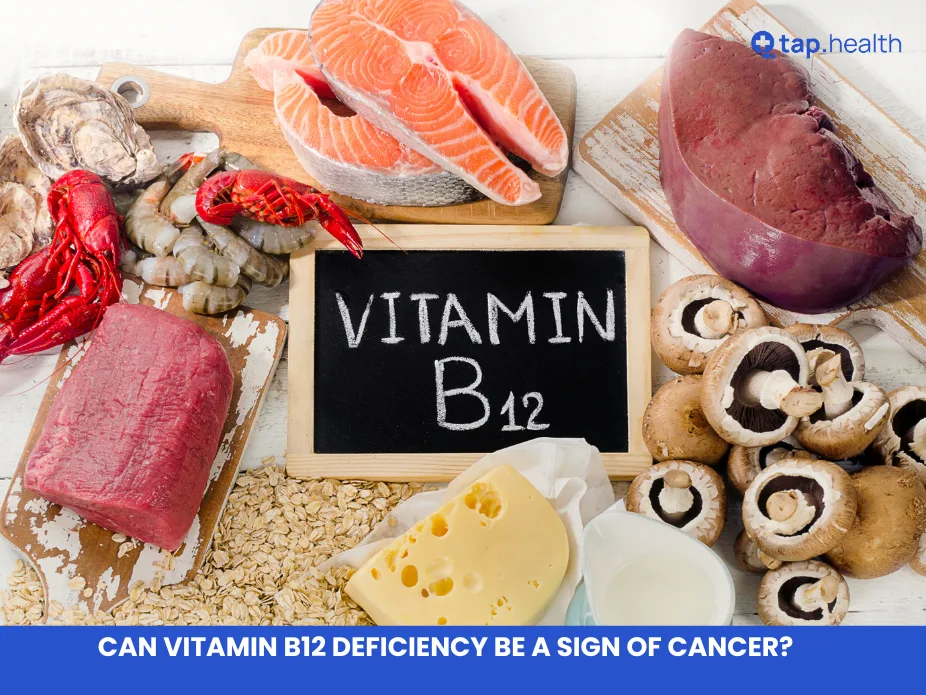Vitamin B12 deficiency is common, but in rare cases it can act as an early warning signal for serious conditions, including certain cancers. This blog explains the connection, symptoms to watch, associated cancers, and what you should do.
What Causes Vitamin B12 Deficiency?
Vitamin B12 (cobalamin) is vital for red blood cell formation, nerve health, and DNA synthesis. The body cannot produce it, so it must come from food or supplements. Common causes of deficiency include:
- Poor dietary intake (especially in vegetarians/vegans)
- Pernicious anemia (autoimmune attack on intrinsic factor)
- Gastrointestinal disorders (Crohn’s, celiac disease)
- Long-term use of metformin, proton-pump inhibitors, or H2 blockers
- Gastric surgery or conditions that reduce stomach acid/intrinsic factor
In some cases, the deficiency is caused by cancers that interfere with B12 absorption or utilization.
How Is Vitamin B12 Deficiency Linked to Cancer?
Low B12 does NOT cause cancer, but certain cancers can cause low B12 levels by:
- Blocking Absorption
- Gastric (stomach) cancer destroys cells that produce intrinsic factor
- Pancreatic cancer reduces digestive enzymes needed for B12 release from food
- Small intestine tumors or severe inflammation
- Affecting Blood Cell Production
- Leukemia and myelodysplastic syndromes impair bone marrow, mimicking B12-deficiency anemia
- Increasing Metabolic Markers Elevated methylmalonic acid and homocysteine (seen in B12 deficiency) are independently linked to higher cancer risk in some studies.
Which Cancers Are Most Commonly Associated with B12 Deficiency?
- Gastric cancer
- Pancreatic cancer
- Leukemia and lymphoma
- Multiple myeloma (rare cases)
- Carcinoid tumors of the stomach or ileum
Key Symptoms of Vitamin B12 Deficiency That Overlap with Cancer
- Persistent extreme fatigue
- Unexplained weakness
- Pale or jaundiced skin
- Shortness of breath and dizziness
- Tingling/numbness in hands and feet
- Balance problems or difficulty walking
- Memory issues, depression, or irritability
- Glossitis (smooth, red tongue)
If these symptoms appear suddenly or worsen quickly in someone over 50, cancer screening is often warranted along with B12 testing.
Real-Life Examples
Anjali, 45, experienced fatigue and hand tingling for months. Tests showed severe B12 deficiency followed by early-stage gastric cancer diagnosis. Timely surgery saved her life.
Raj, 60, blamed age for dizziness and breathlessness. Low B12 led to scans that revealed pancreatic cancer at a treatable stage.
These cases show why persistent B12 deficiency symptoms should never be ignored.
When Should You Get Tested?
Seek medical advice if you have:
- Multiple B12 deficiency symptoms lasting >4 weeks
- Risk factors (vegetarian/vegan diet, gastric surgery, family history of gastric cancer, chronic PPI use)
- Unexplained anemia or neurological symptoms
A simple blood test for serum B12, methylmalonic acid, and homocysteine can confirm deficiency. If levels are low, further tests (endoscopy, CT scan, etc.) may be needed to rule out malignancy.
How to Prevent and Correct Vitamin B12 Deficiency
- Eat B12-rich foods: meat, fish, eggs, dairy
- Vegetarians/vegans: take 250–500 mcg daily supplement or fortified foods
- Regular screening if you have risk factors
- Treat underlying causes promptly
Expert Insight
Dr. Priya Sharma, Oncologist, AIIMS: “While most B12 deficiency cases are benign, new-onset deficiency in adults over 40–50, especially with weight loss or GI symptoms, should trigger cancer screening. Early detection dramatically improves survival in gastric and pancreatic cancers.”
Can Vitamin B12 Deficiency Be Linked to Diabetes? (TapHealth Special)
Yes. Long-term metformin use (common in type 2 diabetes) reduces B12 absorption in up to 30% of patients. Regular monitoring of B12 levels is recommended for every diabetic patient on metformin for >4 years, according to American Diabetes Association guidelines. Correcting deficiency may also improve diabetic neuropathy symptoms.
Stay proactive about your B12 levels — it could be more than just a vitamin issue. Consult your doctor for personalized advice and timely testing.



